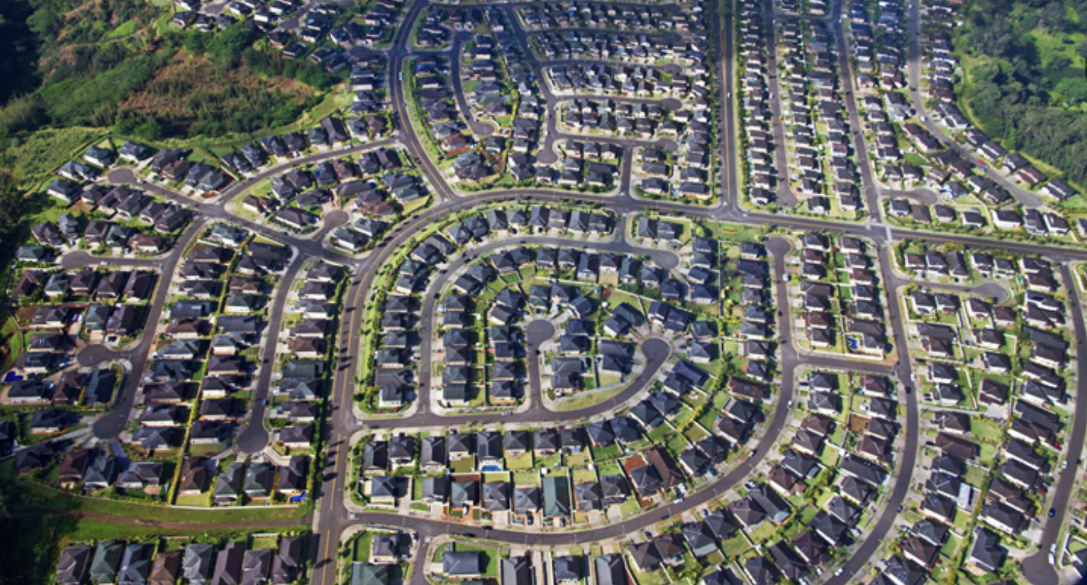- Conventional wisdom says that U.S. cities are so sprawling because people want to live in the suburbs. But what if single-family zoning were distorting the real estate market? Polls show that the majority of Americans want to live in a walkable neighborhood — a preference that's also reflected in high demand and high home prices in denser areas. (Yale Climate Connections)
- Grist explores whether an urban or rural lifestyle is more sustainable.
- The Trump administration's since-rescinded funding freeze memo (that the administration might still be implementing anyway?) could have paralyzed local and state governments, which rely on the feds for big chunks of their budgets. (Governing)
- Cities need to get a handle on sidewalk delivery robots before they become a bigger problem for pedestrians, cyclists and people with disabilities. (Policy Options)
- The U.S. Department of Transportation issued a memo ordering the agency to prioritize grants for communities with high marriage and birth rates. (HuffPost, Streetsblog)
- President Trump is still considering trying to halt congestion pricing in New York City. (NY Times)
- Just before Joe Biden left office, the Federal Trade Commission launched an investigation into whether Uber and Lyft colluded to keep drivers' pay low in New York City. (NY Post)
- Baltimore is contracting with a Canadian firm to start a bikeshare with 500 bikes at 50 locations. (WBAL)
- At a recent summit, Detroit transit advocates urged the city to double funding for transportation. (Bridge Detroit)
- A draft of a bill in the Texas legislature would cut funding for Dallas transit by 25 percent as several cities in the metro area seek to contribute less funding to the regional agency. (KERA)
- Raleigh is launching a program called Safe Streets for All that aims to halt traffic deaths by 2045. (News & Observer)
- The Strong Towns podcast "The Bottom-Up Revolution" interviews a San Antonio mom and biking advocate.
- Oklahoma City bus and streetcar riders are largely satisfied with transit service, according to a survey. (Mass Transit)
- The Netherlands taxes heavy cars and uses the revenue to keep its roads in tip-top shape. (Telegraph)
- In Hyderadad, India, doctors transported a heart for a transplant operation between two hospitals in just 13 minutes using light rail. (Railway Gazette)
- Copenhagen offers tourists incentives like free museum admission if they do something to help the environment, such as take transit rather than drive. (Harvard International Review)
Today's Headlines
Monday’s Headlines Question Sprawl
Do Americans really want to live in car-centric suburbs, or are they forced to because that's where most of the housing is built?

Low-density sprawl is a result of a failure to create transit-oriented development.
|Photo: InhabitatStay in touch
Sign up for our free newsletter
More from Streetsblog USA
Talking Headways Podcast: The Annual Prediction Show with Yonah Freemark
Yonah Freemark joins Talking Headways for their annual discussion of future of transit in the United States (and Mexico).
‘Stupendous Potential’: Pay-Per-Mile Auto Insurance Would Cut Costs And Traffic Violence
Lowering car insurance costs doesn't have to eviscerate crash victims's rights.
Urban Truth Collective: Straight Talk About The Joy Of Cities In An Age Of Disinformation
The Three Tenors of Urbanism explain their latest effort: The Urban Truth Collective.
Study: AVs Will Super-Charge VMT
Yes, robocars address many of our traffic violence troubles, but they may fail to uproot the deeper rot of car dependency that has hollowed out our society
Thursday’s Headlines Try New Arguments
An urban planner makes a conservative economic case for tearing down freeways running through cities.
Three Theories About Why U.S. Car Crash Deaths Are Plummeting
Car crash deaths are down by 12 percent, a top group estimates — but why?





